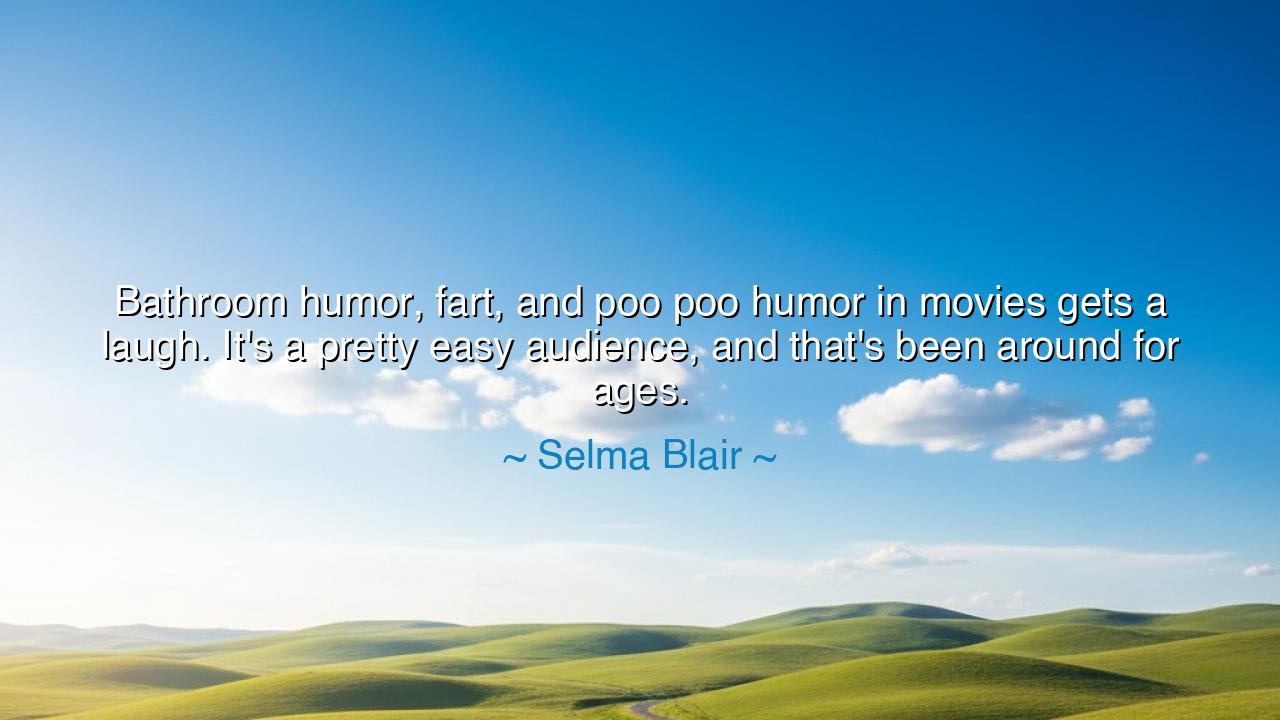
Bathroom humor, fart, and poo poo humor in movies gets a laugh.
Bathroom humor, fart, and poo poo humor in movies gets a laugh. It's a pretty easy audience, and that's been around for ages.






In the candid and perceptive words of Selma Blair, the actress of both wit and vulnerability, there echoes a truth as old as laughter itself: “Bathroom humor, fart, and poo poo humor in movies gets a laugh. It’s a pretty easy audience, and that’s been around for ages.” Though she speaks of jest and simplicity, there lies beneath her words a profound reflection on the nature of humor, on what it reveals about our shared humanity. For laughter, whether born of the sacred or the silly, is a mirror that reflects not only our intellect, but our humility — the recognition that beneath all titles, all masks, and all vanities, we are creatures of earth and body, bound by the same absurd truths.
Selma Blair reminds us that humor of the body — the jokes about the things we all do but rarely speak of — has endured since the dawn of storytelling. The ancients, too, laughed at such things. The plays of Aristophanes, written in Athens over two thousand years ago, were filled with earthy laughter — jokes of the flesh, of digestion and desire — and yet these plays were performed before philosophers and poets, kings and commoners alike. Such humor crossed the boundaries of class and intellect, because it spoke to what is most universal in us: the frailty and folly of being human. In this, Blair’s observation becomes a reflection on the timeless power of laughter to unite — not through sophistication, but through shared imperfection.
To call such laughter “easy” is not to dismiss it, but to recognize its purity. It is the laughter of the child, unfiltered and honest, that springs not from cleverness but from recognition. The body betrays us all — it stumbles, sneezes, digests, and breaks wind — and so we laugh, not out of cruelty, but out of relief. For laughter here is release, a soft rebellion against the seriousness that burdens the spirit. Even in the courts of the mighty, jesters once used such crude humor to remind kings that they, too, were mortal — that even thrones cannot free one from the ridiculous truths of the flesh. Such humor, then, is not vulgarity, but a form of grounding, a reminder that life, though divine, is delightfully undignified.
Blair’s wisdom also hints at endurance — that this kind of humor “has been around for ages.” Why does it persist when so many other forms fade? Because it speaks the language of the body, and the body is eternal. Empires rise and fall, art evolves, and technology changes the world, but the body remains the same, with its same frailties and functions, its same comic potential. As long as humans live, eat, and err, there will be laughter about these most human of things. It is not the laughter of mockery but of acceptance — a reminder that to live is to be flawed, and to be flawed is to be funny.
We see this truth not only in art but in life. Consider the story of Charlie Chaplin, the silent poet of cinema, who used his body as his instrument of humor. Though his humor was physical, it was never crude; yet it was born from the same spirit Blair describes — a laughter that arises from the body’s awkward dance through the world. In his famous film The Tramp, Chaplin slips, stumbles, eats awkwardly, and struggles against machines and manners that confound him. The audience laughs, but in that laughter there is tenderness. We laugh because we recognize ourselves — vulnerable, clumsy, human. Chaplin’s comedy, like Blair’s “bathroom humor,” endures because it reveals a truth about our nature: that to be alive is both magnificent and absurd.
The origin of Blair’s reflection comes from her own understanding of performance — of what makes people laugh, and why. As an actress, she has lived in both worlds: the refined and the raw. Her recognition that “it’s a pretty easy audience” does not belittle the humor, but honors its simplicity. It is the laughter that asks for nothing but recognition — a shared moment of release from pretense. And though some might look down upon such humor, it possesses its own quiet wisdom. For when we can laugh at the body, we show that we are not enslaved by it. To find comedy in the crude is to find freedom in the fragile.
Thus, let this teaching be carried forward: humor, no matter how base, is sacred when it connects rather than divides. The laughter that begins with the body may lead, in time, to the laughter of the soul. Do not scorn the simple jest, for it reminds us that beneath all our grandeur and intellect, we share the same needs, the same follies, the same unspoken truths. Laugh, then — not to belittle, but to belong. Laugh, not in arrogance, but in understanding. And remember always, as Selma Blair so wisely notes, that such laughter has been with us “for ages” — as ancient as our humanity itself.
So, children of the future, do not fear the ridiculous. Embrace it. Laugh freely at life’s indecencies, for in that laughter lies humility, healing, and grace. The humor of the body is the beginning of the wisdom of the soul — a reminder that we are all imperfect creatures, bound together not by solemnity, but by shared laughter that has echoed through the ages, as eternal and human as the beating of the heart itself.






AAdministratorAdministrator
Welcome, honored guests. Please leave a comment, we will respond soon